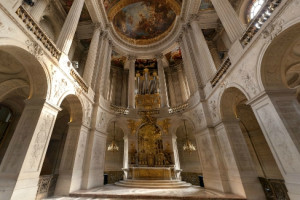JORDI SAVALL: MAGNIFICAT & JUBILATE
Con este programa, Jordi Savall, ha conmemorado el tricentenario de la Paz de Utrecht (1716), que puso fin a doce años de guerra entre Francia y la mitad de Europa con la firma del Tratado de Utrecht.
En ese tratado se estableció que Felipe V fuera reconocido rey de España y de las colonias americanas a condición de que las coronas españolas y francesa no pudieran unirse y que los territorios europeos de la monarquía española pasaran a Austria, mientras que Inglaterra tendría Menorca y Gibraltar.
Se consideró el fin de la guerra, aunque posteriormente a su firma continuaron las hostilidades en el Principado de Cataluña hasta su ocupación definitiva por Felipe V de España en septiembre de 1714 —el reino de Mallorca, excepto Menorca que pasó a soberanía británica, no sería ocupado hasta julio de 1715—.
En este tratado Europa cambió su mapa político
Jordi Savall utiliza varias obras maestras de la música sacra europea para celebrar el establecimiento de la paz.
Jean-Baptiste Lully (1632-1687)
Jubilate Deo, Motet pour la Paix, LWV 77/16
Johann Sebastian Bach (1685-1750)
Ouverture de la IIIème Suite en Ré majeur, BVW 1068
Georg Frideric Haendel (1685-1759)
Jubilate pour la Paix d’Utrecht (O be joyful), HWV 279
1. Sinfonia: Adagio – Allegro
2. O be joyful in the Lord – Solo (alto) & Chœur
3. Servet he Lord with gladness – Chœur
4. Be ye sure that the Lord he is God – Duet (alto & basse)
5. O go your way into his gates – Chœur
6. Fort he Lord is gracious – Terzetto (2 ténors & basse)
7. Glory be to the Father – Chœur
8. As it was in the beginning – Chœur
Antonio Vivaldi – Magnificat en Sol mineur (RV 610, version 1)
1. Magnificat (Adagio)
2. Et exultavit (Allegro)
3. Et misericordia eius (Andante molto)
4. Fecit potentiam (Presto)
5. Deposuit potentes (Allegro)
6. Esurientes (Allegro)
7. Suscepit Israel (Largo)
8. Sicut locutus est (Allegro ma poco)
9. Gloria Patri (Largo)
Johann Sebastian Bach – Air De la IIIe Suite en Ré majeur (BWV 1068)
Johann Sebastian Bach – Magnificat en Ré majeur (BWV 243)
1. Magnificat – Chœur
2. Et exultavit – Soprano II solo
3. Quia respexit – Soprano I solo
4. Omnes generationes – Chœur
5. Quia fecit mihi magna – Basse solo
6. Et misericordia – Alto solo & Ténor solo
7. Fecit potentiam – Chœur
8. Deposuit potentes – Ténor solo
9. Esurientes implevit bonis – Contralt solo
10. Suscepit Israel – Soprano I & II & alto
11. Sicut locutus est – Chœur
12. Gloria Patri – Chœur
After the release of his splendid recording of Bach’s Mass in B minor, Jordi Savall has decided to mark the Tercentenary of the Peace of Utrecht (1713), which put an end to twelve years of war between France and half of Europe, in a programme that brings together four masterpieces that are highly representative of European sacred music as well as being in Latin, for soloists, choir and orchestra, four compositions that celebrate the divine grandeur, the royal power and the establishment of peace.
In 1660, Louis XIV was 21 and married the Infanta of Spain. He inaugurated his absolutist reign in 1661. Lully (then aged 28, he became Superintendent of the King’s Music the following year) celebrated before the Court (the audience included Anne of Austria and the young Queen Marie Thérèse) in his «Jubilate Deo» the Peace of the North which completed the Treaty of the Pyrenees of 1659. But, alas, war was to return regularly in Europe until, at the end of the reign of Louis XIV, a half-century later, the Peace of Utrecht once more established stability between France and Spain. This early Grand Motet by Lully is already a splendid work, with vast choral set-pieces and melodies that were later to seal the success of his lyrical tragedies. No other European composition of this period matches its accomplished «magnificence». This stately ceremonial French style already so recognisable was to conquer Europe…
Composed in 1700, Vivaldi’s Gloria has the force of conviction of the great works celebrating the divine glory, and features all the stunning virtuosity of the Venetian maestro. Written for the famous choir of the Ospedale della Pietà, the work has a rare inventiveness and the trumpet blast of Fame has saluted its bravura musical accomplishment ever since.
Handel composed his Jubilate to celebrate the Peace of Utrecht, in 1713, in a style that combines the tradition of Purcell and musical influences of Italy from which Handel had just left. This elaborate work celebrates the glory of the English Court as much as the Peace…
Lastly, Bach’s Magnificat is an outstanding example of the perfection achieved in the work of the Cantor, using more than ever before combinations of contrapuntal structure and mathematical figures to create a work of stunning beauty and eloquence, a veritable tour de force for choirs. Could this adoration by the Virgin Mary of the newly-born Christ be the choral masterpiece of Bach?






Magnific..! <3
En un repertorio que domina el Maestro, especialmente el barroco francés.